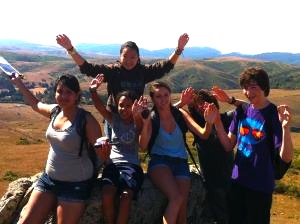Marin School of Environmental Leadership
MarinSEL is a school within a school focused on project-based education and environmental issues. It is designed to create community leaders of tomorrow.
About the project
The Marin School of Environmental Leadership (MarinSEL) is comprised of students, parents and educators from Marin County and beyond who are committed to building a vibrant community school within Terra Linda High School in San Rafael, California. MarinSEL provides youth with real world, field-based opportunities to build leadership skills while they become stewards of the environment.
MarinSEL is raising money for a Leadership Retreat for students that will support the development of individual and group leadership skills and foster a sense of community for the program. Students will learn in nature over the course of a long weekend aside their classmates and teachers.
MarinSEL is a school within a school, like a magnet school. MarinSEL students are integrated with the Terra Linda High School community and attend many of the conventional classes that are taught. MarinSEL distinguishes itself by offering an innovative curriculum that builds on the traditional subjects and augments the students’ high school experience.
The framework for teaching at MarinSEL is progressive education with a focus on environmental leadership. Progressive schools are not rigidly defined, but share some common goals—that education should be integral with action, that learning should be multi-disciplinary, that a child’s personal initiative should be fostered, and that they will learn to see themselves as active participants in the world around them. Students who are so wholly engaged in their own learning will develop the skills needed to be leaders in their communities. Through community-focused learning, they become strong individuals and ideal candidates for the finest colleges.
With the additional focus on environmental issues, students will be prepared to meet the challenges of a changing society. By having sustainability infused into their education, MarinSEL students will understand the interconnectedness of systems (environmental, social, and economic). This will prepare them to stand out as adults, no matter what their area of focus—art, science, engineering, or business.
The Steps
MarinSEL is entering 2012 at full speed. We have just entered the new school year with thirty new 9th graders, and thirty 10th graders in the program. We are developing and refining curriculum and providing training to our MarinSEL teachers. In addition, we have established a Lead Teacher for the school.
As we look ahead, we are excited for our vision for the school. We would like to expand the program to 60 students per grade level, and have a successful 4-year program available to these students.
The 11th grade curriculum will be developed to allow all students to participate in AP and Honors classes, while still enabling them to benefit from the specialized MarinSEL curriculum. We are excited as we look forward to Senior year, where students will spend their Seminar class focused on one project, structured as an internship within the local community.
Why we‘re doing it
In an era of high stakes testing, the public school education system has narrowed its focus.
From our site: “According to a recent Gallup poll, a majority of Americans believe that the No Child Left Behind Act (NCLB) has caused schools to cut time for science, health, social studies and the arts to make more time for mathematics and reading. The vast majority of Americans who observe this trend see it as a problem; they evidently do not want the curriculum to contract to a core of reading and math.”
The focus on learning skills in a vacuum is repetitive, boring, and ultimately damaging to so many students. There is such strong emphasis on preparing for the tests required under NCLB that the love of learning the subject matter, and integrating that learning with other subjects, is frequently lost. Students are learning to take tests, and memorize information that might be on a test, rather than learning for learning’s sake.
In addition to subject matter scope, there is the issue of class size. High schools tend to double or triple in population as students transition from middle school to high school. Students lose the capacity to build personal relationships with their teachers, and to build community within their environment.
There has been a lot of emphasis recently on developing new charter schools. We don’t want to give up on the incredible network and infrastructure that the existing public education system provides. We believe that creating a school within a school will answer the need for an integrated depth of learning that provides students with the leadership skills needed for participation in our dynamic global community.

